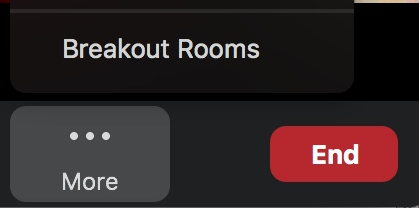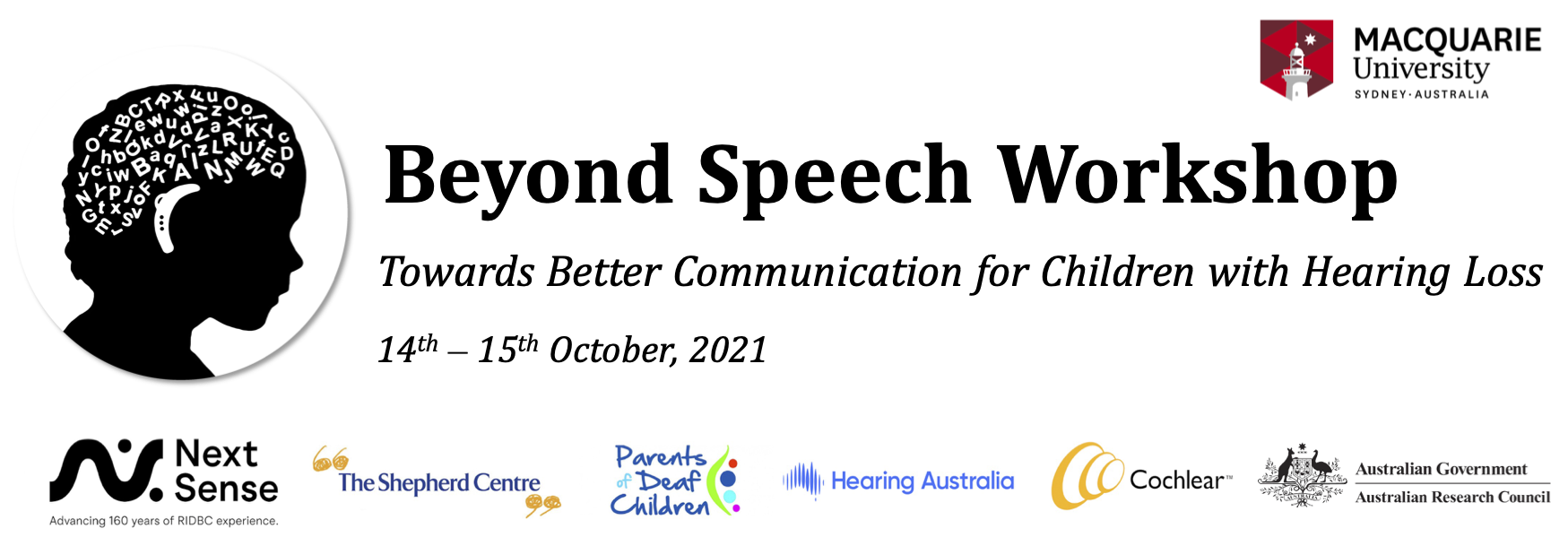Workshop October 2021
Online registration has now closed. The live-streaming link will be sent to all registered participants and is also available here. Please contact us if you wish to register on the day.
For participants in time-zones that would make live-streaming difficult, the talks will be available at the same link for two weeks after the event. We will also email you a reminder.
Live Auslan sign language interpreters will be online for all sessions and closed captioning options will also be available.
Program enquiries to Ben Davies: ben.davies@mq.edu.au
General enquiries to Pamela Pan: pamela.pan@mq.edu.au
Information about the workshop
Children with hearing loss face unique challenges when acquiring spoken language. Despite advances in early identification, hearing devices an intervention, many children with hearing loss still experience challenges achieving effective communication. Expanding upon the success of our 2020 event, this multidisciplinary online workshop brings together perspectives on these children's language development from researchers, clinicians, health practitioners and families alike.
Keynote Speakers
- Susan Nittrouer (University of Florida)
- Catherine McMahon (Macquarie University)
- Suzanne Purdy (University of Auckland)
- Christine Yoshinaga-Itano (University of Colorado)
Organising Committee
- Ben Davies
- Katherine Demuth
- Rebecca Holt
- Chi Yhun Lo
- Katie Neal
- Isabel O'Keeffe
- Pamela Pan
- Mridula Sharma
- Elise Tobin
Workshop Sponsors
- ARC Linkage Grant LP180100534 (Demuth & Sharma)
- ARC Laureate Fellowship FL13010014 (Demuth)
- Macquarie University Child Language Lab
- Macquarie University Centre for Language Sciences (CLaS)
Program
The program is below or can be downloaded as PDF
Thursday 14 October
| 8:30 | Registration/Virtual Foyer via Zoom |
| 9:00 | Opening and Welcome: Distinguished Professor Katherine Demuth Welcome to Country: Orated by Aunty Julie Janson Introduction to the Workshop: Distinguished Professor Katherine Demuth |
| 9:15 | Keynote Presentation I Chair: Elise Tobin Susan Nittrouer, University of Florida Duality of patterning and children with cochlear implants |
| 10:15 | Break |
| 10:30 | Beyond Literal Meanings: Hearing Loss and Pragmatics Chair: Loes Koring Kristina Blaiser, Idaho State University Using the Language Use Inventory to assess pragmatics in young children who are deaf and hard-of-hearing Rebecca Holt, Macquarie University Comprehension of verbal irony among children with hearing loss |
| 11:30 | Break |
| 12:00 | Panel Discussion: Influence of pragmatic language and functional auditory abilities on quality of life: Insights from the LOCHI study Linda Cupples, Macquarie University Greg Leigh, Macquarie University, NextSense Institute |
| 13:00 | Break |
| 13:30 | Language Learning and Processing Chair: Inge Kaltenbrunn Nan Xu Rattanasone, Macquarie University Many talkers and better word identification for preschoolers with hearing loss. Ben Davies, Macquarie University Subject-Verb agreement, prediction, and hearing loss. |
| 14:30 | Break |
| 15:00 | Communication, Speech and Sign Chair: Titia Benders Katherine Phelan, NextSense Auslan or spoken English early intervention for children who are deaf or hard of hearing: Why not both? Lucie van Bogaert, Université Grenoble Alpes Speech communication tools used for children with hearing loss in France. Martina Curtin, City University of London Analysing early parent-child interaction in deafness. |
| 16:30 | Break |
| 16:45 | Panel Discussion: Perspectives from Parents of Children with Hearing Loss Chair: Chi Yhun Lo, Macquarie University, Parents of Deaf Children |
| 17:30 | Day One Wrap-up: Chi Yhun Lo |
Friday 15 October
Information and FAQs for attendees
Registration has now closed and more information will be emailed to you, including the live-stream YouTube link and the Zoom link for the 'virtual foyer', a place to discuss with speakers.
Where can I watch the live-streamed talks (or watch them after the scheduled times)?
A link will be emailed to all workshop registrants 48 hours before the workshop. A link to the live-streamed talks will be available here.
How can I ask questions of the presenter to answer in their question time?
- Use YouTube chat (you will need to set up a Google or YouTube account).
- Please only use the YouTube chat to ask questions, please don’t not use it for saying ‘hello’ etc., comments and questions will be moderated.
- OR you can send questions to the generic workshop email address (beyond.speech@mq.edu.au). This information will also be emailed to you 48 hours before the workshop.
- The chair will choose questions, so please be aware your questions may or may not be answered (it will depend on the time available and the number of questions).
- Remember that you can ask also ask questions of presenters in the ‘Zoom foyer’ during breaks, the links for the Zoom foyer will be emailed to you 48 hours before the workshop (see FAQ below).
How can I ask questions of speakers or have discussions with other workshop attendees during the breaks?
- All workshop registrants will be emailed a link for the ‘Zoom foyer’ (you can also link this to contact a workshop representative if you are having any issues or have questions).
- Please use this link during tea breaks for informal discussion.
- After being let in from the ‘waiting room’ you will be placed into a breakout room called 'info desk' where you can ask questions of a workshop representative.
- If you are logged into your Zoom account and are on a computer, you will be able to see who is in the other breakout rooms and move there to talk to them (NB. this will not be possible on a phone or a tablet, but you will be able to request to go to particular Zoom breakout rooms).
- Look for the 'Breakout Rooms' logo (which may be under 'More' if your screen is not maximised)


- Please note that all workshop attendees will be able to go in and out of the Zoom break-out rooms. If you wish to have private conversations with workshop attendees that you know, we recommend that you create a new Zoom meeting from your own account.
- We encourage you to sign up for a Zoom account and download the Zoom Client for Meetings/update to the latest version to use on your computer.
- See more information about Zoom breakout rooms here or ask the Workshop representatives in the Zoom foyer.
Content owner: Department of Linguistics Last updated: 12 Mar 2024 9:30am

